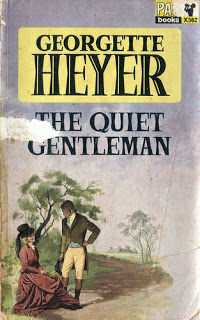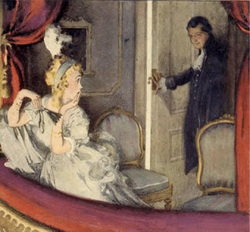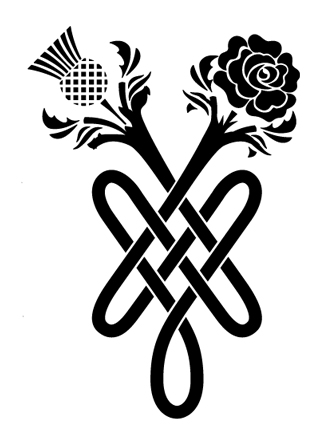
“You would become disgusted with my odious common-sense. Try as I will, I cannot be romantic!” said Miss Morville despairingly.
My recent post, 'Which Heyer Heroine Are You?' attracted considerable interest. Most people (myself included) fell somewhere between Mary Challoner (Devil’s Cub) and Judith Taverner (Regency Buck). Very few people felt identified with Leonie de St Vire, which is probably a good thing. If you’ve read ‘These Old Shades’, you’ll understand that comment. Lovable as Leonie is between the pages of a book, you wouldn’t want her running loose with a sword or a gun.
I loved the suggestion that most of us would probably like to be the Marquesa de Villacanas (The Grand Sophy)! But the heroine many people felt they had most in common with was Drusilla Morville (The Quiet Gentleman).
I have a confession to make here, but there are mitigating circumstances (honest, guv). To my shame, when I first read The Quiet Gentleman, I did not recognise Drusilla as the heroine. When it dawned on me that this staid, dumpy, little figure was, indeed, going to turn out to be the love interest of the handsome hero, Gervase Frant, Earl of St Erth, I felt … well, cheated is the word that springs to mind. It was as if my beloved GH had conned me out of a beautiful, or at the very least, interesting heroine. The mitigating circumstances, I hear you ask? I was fourteen.
Drusilla is the daughter of free thinking, academic and deeply radical parents who scorn such accoutrements as titles and hereditary wealth. They are tenants of St Erth and Drusilla is staying with the Dowager Countess at Stanyon when the Earl arrives at his home for the first time since he inherited the title. To say he is not welcome would be an understatement.
The Earl’s first impression of Drusilla is not favourable. In fact he describes her as having neither countenance nor conversation. As the story unfolds, they become friends and he begins to appreciate her prosaic sayings and common sense approach. It seems poor Drusilla is destined to have her sensible heart broken when, against every dictate of her own nature and despite her best efforts to the contrary, she tumbles headlong in love with Gervase. He, on the other hand, has joined the throng of admirers flocking to the side of the lovely Miss Bolderwood.
Here we encounter Drusilla as she ponders her plight:
‘ … a candid scrutiny of her own face in the mirror soon lowered her spirits … She could perceive no merit either in the freshness of her complexion, or in her dark, well-opened eyes, and would willingly have sacrificed the natural curl in her brown hair for tresses of gold, or even of raven-black. As for her figure, though some men might admire little plump women, she could not bring herself to suppose that St Erth, himself so slim and graceful, could think her anything but a poor little dab of a girl. … 'Depend upon it, you are just the sort of girl a man would be glad to have for his sister! You don't even know how to swoon, and I daresay if you tried you would make wretched work of it, for all you have is common-sense, and of what use is that, pray?'
This embittered thought brought to her mind the several occasions upon which she might, had she been the kind of female his lordship no doubt admired, have kindled his ardour by a display of sensibility, or even of heroism. This excursion into romance was not entirely successful, for while she did her best to conjure up an agreeable vision of a heroic Miss Morville, the Miss Morville who was the possessor not only of a practical mind but also of two outspoken brothers could not but interpose objections to the heroine's actions. … 'You would do better to put him out of your mind, and return to your parents,' she said. 'No doubt he will presently become betrothed to a tall and beautiful woman, and forget your very existence.
Having re-read The Quiet Gentleman many times since I was fourteen, I now count Drusilla as one of my favourite heroines. Along with Hesther Theale (Sprig Muslin), she has me rooting for the ‘ordinary’ girl. And she makes me laugh.
My favourite Drusilla-isms are her comments on some famous academics of the day:
Mrs William Godwin, née Mary Wollstonecraft, is a former friend of Mrs Morville. Drusilla recounts a story about her attempting suicide by casting herself into the Thames at Putney. In her inimitable way, Drusilla states that she had planned to do it at Battersea but it was too crowded there.
Mary Wollstonecraft was an English author and feminist who wrote a Vindication of the Rights of Women in 1792, the first great feminist document. She married William Godwin in 1797 and died in childbirth. Her daughter Mary Wollstonecraft Shelley wrote Frankenstein.
Miss Mary Lamb was described by Drusilla as having ‘murdered her mama in a fit of aberration’. Drusilla was using this example as an illustration of how highly intellectual people can be capable of violent acts.
Mary Lamb along with her brother Charles Lamb was the noted author of Tales from Shakespeare, a children's book. She was considered mentally ill and did, indeed, murder her mother.
One of my recent flights of fancy has been to imagine an Agony Aunt column written by a Heyer heroine. It would have to be one of GH’s self-styled ‘managing females’. Probably Sophy, Frederica or Drusilla.
‘Dearest Drusilla’ … it has a ring to it, doesn’t it?
So, when faced with a letter from a certain aristocratic red-head residing in Bath who wants advice on her tangled love life ( having jilted an Earl just before her wedding she is now engaged to her first love but realises that, despite their stormy relationship, she is still in love with said Earl), I wonder, What Would Drusilla Do?
My recent post, 'Which Heyer Heroine Are You?' attracted considerable interest. Most people (myself included) fell somewhere between Mary Challoner (Devil’s Cub) and Judith Taverner (Regency Buck). Very few people felt identified with Leonie de St Vire, which is probably a good thing. If you’ve read ‘These Old Shades’, you’ll understand that comment. Lovable as Leonie is between the pages of a book, you wouldn’t want her running loose with a sword or a gun.
I loved the suggestion that most of us would probably like to be the Marquesa de Villacanas (The Grand Sophy)! But the heroine many people felt they had most in common with was Drusilla Morville (The Quiet Gentleman).
I have a confession to make here, but there are mitigating circumstances (honest, guv). To my shame, when I first read The Quiet Gentleman, I did not recognise Drusilla as the heroine. When it dawned on me that this staid, dumpy, little figure was, indeed, going to turn out to be the love interest of the handsome hero, Gervase Frant, Earl of St Erth, I felt … well, cheated is the word that springs to mind. It was as if my beloved GH had conned me out of a beautiful, or at the very least, interesting heroine. The mitigating circumstances, I hear you ask? I was fourteen.
Drusilla is the daughter of free thinking, academic and deeply radical parents who scorn such accoutrements as titles and hereditary wealth. They are tenants of St Erth and Drusilla is staying with the Dowager Countess at Stanyon when the Earl arrives at his home for the first time since he inherited the title. To say he is not welcome would be an understatement.
The Earl’s first impression of Drusilla is not favourable. In fact he describes her as having neither countenance nor conversation. As the story unfolds, they become friends and he begins to appreciate her prosaic sayings and common sense approach. It seems poor Drusilla is destined to have her sensible heart broken when, against every dictate of her own nature and despite her best efforts to the contrary, she tumbles headlong in love with Gervase. He, on the other hand, has joined the throng of admirers flocking to the side of the lovely Miss Bolderwood.
Here we encounter Drusilla as she ponders her plight:
‘ … a candid scrutiny of her own face in the mirror soon lowered her spirits … She could perceive no merit either in the freshness of her complexion, or in her dark, well-opened eyes, and would willingly have sacrificed the natural curl in her brown hair for tresses of gold, or even of raven-black. As for her figure, though some men might admire little plump women, she could not bring herself to suppose that St Erth, himself so slim and graceful, could think her anything but a poor little dab of a girl. … 'Depend upon it, you are just the sort of girl a man would be glad to have for his sister! You don't even know how to swoon, and I daresay if you tried you would make wretched work of it, for all you have is common-sense, and of what use is that, pray?'
This embittered thought brought to her mind the several occasions upon which she might, had she been the kind of female his lordship no doubt admired, have kindled his ardour by a display of sensibility, or even of heroism. This excursion into romance was not entirely successful, for while she did her best to conjure up an agreeable vision of a heroic Miss Morville, the Miss Morville who was the possessor not only of a practical mind but also of two outspoken brothers could not but interpose objections to the heroine's actions. … 'You would do better to put him out of your mind, and return to your parents,' she said. 'No doubt he will presently become betrothed to a tall and beautiful woman, and forget your very existence.
Having re-read The Quiet Gentleman many times since I was fourteen, I now count Drusilla as one of my favourite heroines. Along with Hesther Theale (Sprig Muslin), she has me rooting for the ‘ordinary’ girl. And she makes me laugh.
My favourite Drusilla-isms are her comments on some famous academics of the day:
Mrs William Godwin, née Mary Wollstonecraft, is a former friend of Mrs Morville. Drusilla recounts a story about her attempting suicide by casting herself into the Thames at Putney. In her inimitable way, Drusilla states that she had planned to do it at Battersea but it was too crowded there.
Mary Wollstonecraft was an English author and feminist who wrote a Vindication of the Rights of Women in 1792, the first great feminist document. She married William Godwin in 1797 and died in childbirth. Her daughter Mary Wollstonecraft Shelley wrote Frankenstein.
Miss Mary Lamb was described by Drusilla as having ‘murdered her mama in a fit of aberration’. Drusilla was using this example as an illustration of how highly intellectual people can be capable of violent acts.
Mary Lamb along with her brother Charles Lamb was the noted author of Tales from Shakespeare, a children's book. She was considered mentally ill and did, indeed, murder her mother.
One of my recent flights of fancy has been to imagine an Agony Aunt column written by a Heyer heroine. It would have to be one of GH’s self-styled ‘managing females’. Probably Sophy, Frederica or Drusilla.
‘Dearest Drusilla’ … it has a ring to it, doesn’t it?
So, when faced with a letter from a certain aristocratic red-head residing in Bath who wants advice on her tangled love life ( having jilted an Earl just before her wedding she is now engaged to her first love but realises that, despite their stormy relationship, she is still in love with said Earl), I wonder, What Would Drusilla Do?






 RSS Feed
RSS Feed